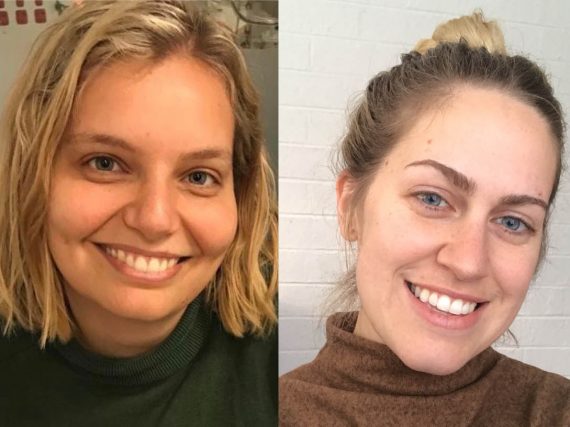Social Work and Juris Doctor student 2020 reflections
Despite ongoing COVID restrictions, placements for RMIT Social Work and Juris Doctor students have continued throughout 2020, albeit from home. Social work student, Anushia Andrews, recently completed her placement at the Law and Advocacy Centre for Women and Juris Doctor student, Katrina Harte, recently completed a placement at the Young Workers Centre. Read their reflections on the challenges they faced and the innovative ways of adapting to undertaking a remote placement.

Anushia Andrews, RMIT Master of Social Work student graduating 2020
This semester I completed my final social work placement remotely at the Law and Advocacy Centre for Women, a legal practice for criminalised women and gender diverse people that integrates legal and case management support. Doing placement remotely during COVID-19 restrictions, I didn’t get the direct client placement experience I’d expected, but gained valuable experience in adapting to crisis, to remote service delivery, and to working independently from home. I’ve always been very focused on direct social work practice, but I became more open to gaining experience with the macro research, policy and advocacy elements of social work. I had to learn to see how the research and advocacy work I was doing also made a difference, albeit in a more abstract way.
My fellow placement student and I completed a project on integrated practice, social workers providing wrap-around support in legal settings to try to address the underlying reasons for people’s involvement with the legal system and reduce reengagement with the legal system. We completed a comprehensive literature review on integrated practice, and an internal review of LACW’s integrated practice informed by consultations with LACW staff. You can read the literature review here.
What attracted me to placement at LACW was that there seemed to be plenty to do (which turned out to be both a blessing and a curse!), and our research would genuinely make a difference to LACW’s integrated practice, and I hope in turn to LACW’s clients. Both Kat Ogilvie (our social work supervisor) and Ellie Pappas (LACW’s CEO) were invested in this research project, and committed to implementing the findings of our research.
Social work placement is always challenging – completing 500 hours, doing paid work on top of placement hours, settling into a new organisation, developing your social work skills, and demonstrating your learning. But this placement had unique challenges of completing placement while also dealing personally with the COVID-19 crisis, and the double isolation of doing a research-based placement and working from home. It was a huge challenge not having an immersive learning experience. Initially it did feel socially isolating not being able to get to know staff naturally in the office, and not having opportunities to chat, debrief, or catch up on our lunchbreaks.
Self-care is always important but especially while working from home – I quickly learnt that I needed to take breaks from the screen, move regularly, drink water, and chat to someone, whether that was with a colleague on Zoom or with a housemate. I went for a walk after placement each day to recreate the transition from work and rest I usually get while commuting to and from home.
In this placement I developed my ability to self-advocate for my own needs, particularly communicating how challenging doing eight hours of screen time a day (my previous social work experience hadn’t prepared me for this!), and figuring out how to alternate tasks and get much-needed social connection. We introduced more informal, group and peer supervision to debrief and have fun in our work. LACW also made sure to involve us in all Zoom staff meetings. Even though I initially felt like a fly on the wall, the staff meetings were an invaluable way for me to understand the work LACW does and feel like a part of the team.
Placement at LACW has given me such valuable learning opportunities – I’ve learnt about the intersections between social work and law, how to navigate legal systems, and supports available in the justice system. I learnt a lot about how criminalised women experience intersecting forms of oppression and marginalisation, including family violence, homelessness, poverty, trauma, mental illness, addiction, and social exclusion, and how criminal justice systems compound this oppression through over-policing and overincarceration of marginalised groups, ‘tough on crime’ policies such as harsh bail laws, and punitive rather than restorative justice processes. Before doing placement at LACW I hadn’t considered practicing social work in a legal setting, but now I see legal settings as a valuable setting for social workers to develop our understanding of legal systems, practice holistically and collaboratively, and support marginalised people experiencing interconnected legal and social issues.
I’d like to thank all the staff at LACW for making us feel welcome even though we’ve never met in person! I’d particularly like to thank our supervisor Kat Ogilvie, who gave us so much time and support even though she was also dealing with the challenges of working from home.
____________________________________________

Katrina Harte, RMIT Juris Doctor student
In semester two of 2020 I undertook an internship with the Young Workers Centre which I completed as part of my Clinical Legal Education. Due to Covid-19 restrictions, I undertook the internship remotely. Prior to undertaking the internship I had not had any experience with Community Legal Centres (CLCs), nor did I have a proper understanding of their role within the legal industry.
As part of my Clinical Legal Education I was tasked with creating a resource for the Young Workers Centre which would support their work in educating young people about their workplace rights and entitlements and help the Centre in expanding their online platform and outreach program. For my resource I created a pdf guide for apprentices which provided information about common workplace issues, places that apprentices could find support as well as step-by-step instructions on navigating the relevant legal avenues for apprentices interested in self-representing whist taking action against their employers.
The internship was a really valuable experience for me as it as enabled me to gain a proper awareness of the importance of CLCs in promoting access to justice to members of the community who may not otherwise have an appropriate knowledge, understanding or means to obtain legal advise or support. The internship also enabled me to get a good understanding of the inner workings of the Young Workers Centre and the day to day role of their solicitors and advocates.
As someone who works in WorkCover and is interested in pursuing a career in employment law, the internship was invaluable to me as it allowed me to get experience in relation to both the practical realities as well as the triumphs of a career in employment law within the CLC sector.
While undertaking the internship remotely was challenging at times, I felt fully supported throughout the experience and truly felt as though I was a part of the Young Workers Centre as I was included in daily employee meetings and catch ups. I would highly recommend undertaking an internship with the Centre for Innovative Justice for anyone considering doing one. Not only have I been able to create a resource designed to empower young people to access legal support, I have also gained an understanding of the career paths which exist in the Community Legal space whilst making friends and connections.


